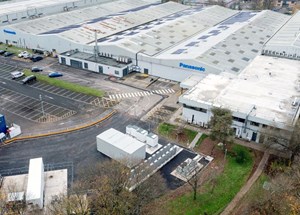News
Panasonic installs in-house H2-based renewable energy power generation system in its UK factory
Panasonic Corporation has completed the installation and begun trial operation of a demonstration power generation system at Panasonic Manufacturing UK Ltd. (PMUK), which develops, manufactures and sells microwave ovens and other products. The microwave oven assembly factory is powered by renewable energy generated by the system through the integrated control of three types of energy sources: pure H2 fuel cell generators, photovoltaic generators and storage batteries.
PMUK will enhance resilience by efficiently generating and storing only the amount of electricity required onsite. Additionally, it will establish an energy management system (EMS) that tracks changes in the factory's electricity demand and weather changes in the UK. The EMS will begin operation by the end of March 2025 and provide a stable supply of renewable energy to the microwave oven assembly factory.
PMUK has installed 21 units of 5-kW pure H2 fuel cell generators as part of a distributed system optimized for the amount of electricity used in its microwave oven assembly factory. In combination with 372-kW photovoltaic generators and 1-MWh storage batteries, PMUK aims to operate the system to supply the necessary electricity from 100% renewable energy. The integrated control of 21 pure H2 fuel cell generators will level out the operating hours of each unit and improve maintainability, allowing for uninterrupted maintenance.
Further, by using green H2 produced in the UK, the electricity used in the microwave oven assembly factory will be decarbonized. To power the microwave oven assembly factory, the photovoltaic power generation system for the demonstration uses an output of 372 kW, a portion of the total 760-kW output from photovoltaic power generators installed on the roof of the PMUK building last year. Panasonic will develop a highly effective solution that enables the integrated control of three types of batteries by combining existing photovoltaic generators with newly installed pure H2 fuel cell generators and storage batteries. The effectiveness of the solution will also be verified.
At this demonstration facility, heat generated during the electricity production by the pure H2 fuel cell generators will be used to provide heating and hot water in the microwave oven assembly factory, aiming to achieve an energy efficiency of 95% for the pure H2 fuel cell generators with the cogeneration effect. The heat generated during power generation will be used to preheat water for the newly installed "water circulation air conditioning system" (which collects heat from the atmosphere to create cold and hot water that is circulated around the room to adjust the room temperature), thereby further reducing power consumption during hot water heating operation through integrated heat utilization.
Additionally, the factory aims to integrate the use of heat from existing electric boilers to reduce the power consumption required to supply hot water within the factory. When controlling the EMS, demonstration data will be accumulated concerning the balance of power supply and demand, depending on changes in weather conditions, fluctuations in power demand, and other factors, while incorporating external local weather forecast data.
This will help Panasonic accumulate know-how for enhancing the EMS, one of its core technologies, strengthen its supply and demand adjustment technology to minimize losses in the generation, storage, and transmission of renewable energy, and ensure a stable energy supply.
This demonstration uses green H2 for in-house power generation and integrates and controls three types of energy sources to run the factory on 100% renewable energy in environmentally advanced European countries. This globally unique initiative is the first attempt even for Panasonic. Through this demonstration, Panasonic aims to achieve a solution that is optimal for the characteristics of the region.
Furthermore, through the operation of the demonstration system, the company will also seek to build relationships with local partner companies and business customers related to the H2 business to establish a business foundation. Aiming for a society where well-being and sustainability are compatible, Panasonic will create new businesses that contribute to UK society and climate change measures. It will also tackle efforts to develop its business from a long-term perspective toward the realization of a future H2 society and carbon neutrality.


